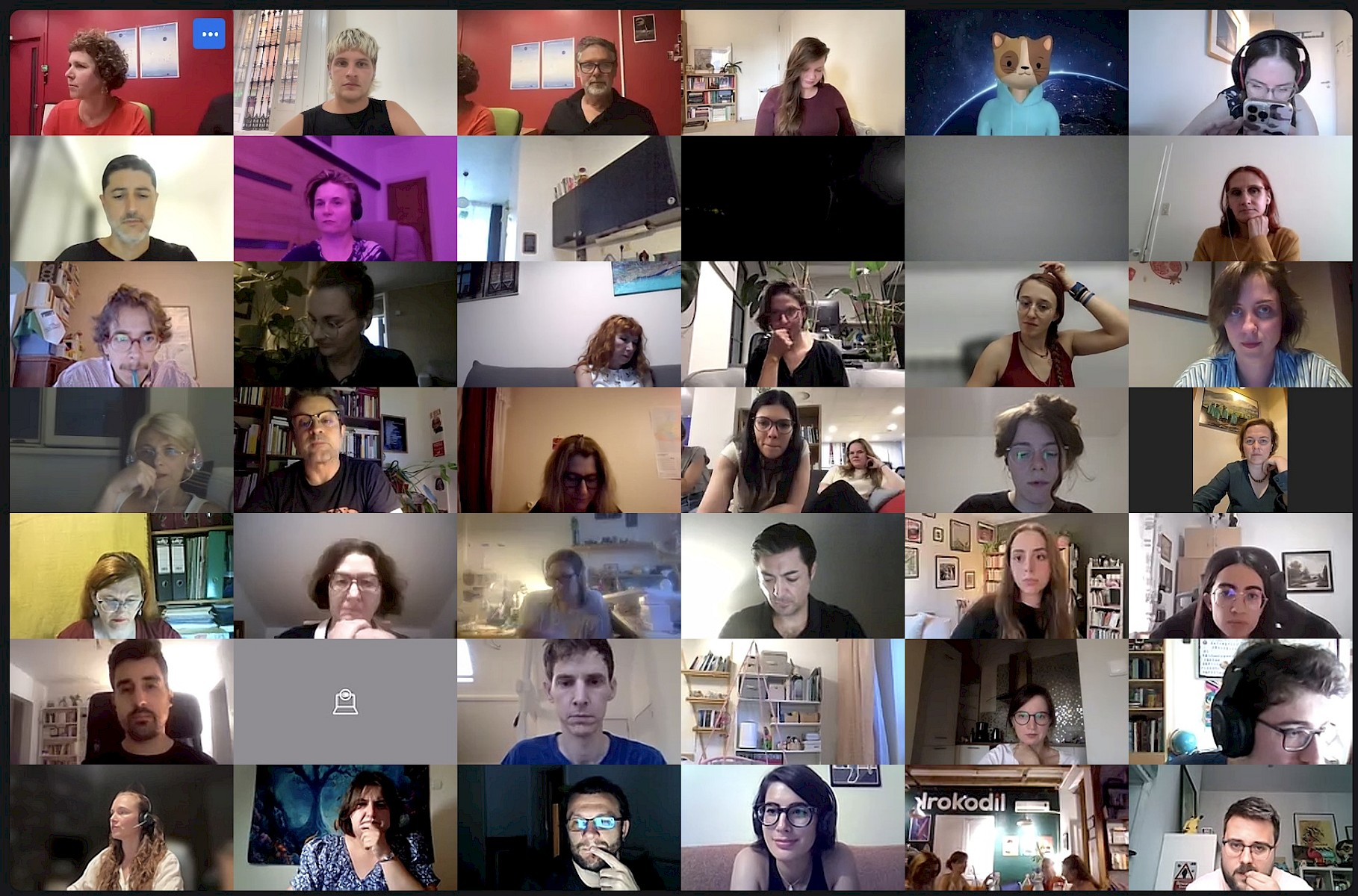A patchwork of the CELA Opening Lecture
On September 4, 2024, the Ukrainian writer Oksana Zabuzhko hosted an online lecture for all translators, writers and staff involved in CELA. Even though circumstances in Kyiv were trying, Zabuzhko managed to present the translators and writers with an urgent, relevant but most of all empowering and inspiring message. In a collaborative project, the CELA staff, participants and Zabuzhko created a patchwork summary of the most urgent points in the lecture. The text below is a collage of our notes.
In a poignant and eloquent lecture, Oksana Zabuzhko showed precisely what is at stake for Europe and for literature. She radiates flamboyance and profound humanism, despite the lecturer's dire conditions; due to energy cuts she reads from the shaded offices of Mystetskyi Arsenal. She says: We are here to discuss more profound issues than the ones imposed on us through bombing. The message of her lecture was clear: Writers must detail the full extent of the human experience, autonomously and collectively, or they will be forcibly silenced.
Can we tell everything? Do we have words for everything? Literature's function is naming the unnamable. Naming the unnamable is the primordial function of literature. Writers and translators are in the same boat: like Adam, they must name the unnamed, the unsaid. This essentially means: breaking the silence. Of course, sometimes silence is a strategy to stay alive, but you must speak for yourself to protect yourself. If you don't, someone else will (speak for you), making up your story in your name. Which might not always be in your interest. Even if we had the words, is it really necessary to say everything? And do we really want to know?
We are all translators. We all need to find words for what remains unsaid. We need a language with which we can express these different experiences, so that others can understand us. We must improve our language so we can translate experiences or texts.
In war, what is winning if not the ability to tell one's story? Surviving to tell your own story is a cultural victory. Cleaning things up, historically speaking, is not possible without recording the story. Breaking the silence can be compared to what Shakespeare tells us at the end of Hamlet, where Fortinbras says to Horatio: clean up everything and tell (write down) what happened. In other words: you can't clean up without recording. You have to tell the story to the ones that don’t know about it. In short: we are obliged to tell the formerly banned, muted truth. We are on a Fortinbras mission: time to speak is also time to clean up.
Forced muteness deforms memory, culture, identity (a propos of oppressive regimes, or not digesting entirely one’s past). Silence deforms through generations. Do not forget what Erich Fromm teaches us in The Art of Loving, this is important: ‘When values are replaced by knowledge and information, culture dies.’
From an interview with a Ukrainian soldier on TikTok:
Journalist: ‘Can you tell me what the most horrible experience you witnessed in the war was?’
Soldier: ‘I don’t want to talk about it. You don’t need to know.’
Journalist: ‘Why don’t you want to tell me?’
Soldier: ‘Nobody can understand it.’
There was a cultural misunderstanding between the interviewer and the interviewee, there was no translation available.
Literature shows signs way before a war exposes our system crisis. Literature indicates the temperature of society (like human markers), and has a predictive, displaying value: it shows signals beforehand. In other words, exploring the past of which we are not aware shows the future. That is what makes writers and translators the veins of Europe: You make Europe whole; you are the pioneers of understanding.
For Virginia Woolf, writing is deep pleasure, while being read is superficial pleasure. For me, being translated is both a deep and a superficial pleasure. What (my) translators do is like a blood transfusion in another literature. Addressing the participants: you are the blood vessels of Europe, ensuring blood transfusion of European literature and making and keeping Europe whole. Translators are the future of European literature.
(Here follows a reference to her essay, ‘The tale of two Adrians’, a propos of minor and major literatures and how two different writers from across Europe come to write very similar novels, despite the cultural differences. Plus the proposition of coining the Central-European novel, together with Olga Tokarczuk, which unfortunately never caught on - in the early 2000s, when many fiction novels from the former communist countries were published.)
The difference between writing in larger and writing in smaller languages is that “I have to read T. S. Eliot, but T. S. Eliot doesn't have to read me” (a formula that belongs to the Yiddish author Jacob Gladstein). Writing prose is also a form of translation. Prose translates the chaos of life and its fractals into stories. Literature is a very intimate relationship between 'you' and 'I'. No book knows that you have written any other book before.
Oksana Zabuzhko is a Ukrainian writer, poet and active public figure, who in her work concerns herself mostly with Ukrainian national identity and gender. She is known most of all for her novels Fieldwork in Ukrainian Sex, and The Museum of Abandoned Secrets. Her prose and poetry has been translated in multiple languages and her literary work has received a multitude of grants and awards.
Special thanks to the notebooks of Simina Popa, Hanan Faour, Raffaele Cataldo, Pia Prezelj, Lieven Stoefs, Ajda Bračič, Olga Bondarenko, Valeria Usala and Frank Tazelaar.
